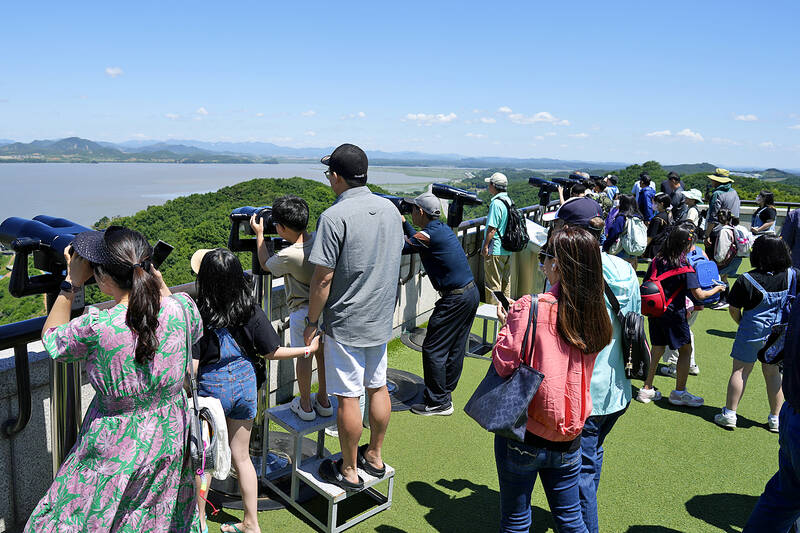North Korea’s latest satellite launch exploded in a fireball before dropping into the Yellow Sea just minutes after lifting off, but analysts say the attempt showcased new strides in the nuclear-armed nation’s race for space.
North Korea said its latest attempt to launch a military reconnaissance satellite failed in flight on Monday during the rocket’s first stage, which featured a new “liquid oxygen and petroleum engine.”
An initial analysis suggested that the cause of the failure involved the newly developed liquid-fuel rocket motor, but other possible causes were being investigated, a report by the Korean Central News Agency said.

Photo: AP
Although state media did not name the rocket or release photographs, analysts said it was most likely different from the Chollima-1 rocket used in the successful satellite launch in November last year.
The Chollima-1, which also suffered several explosive test failures, uses hypergolic fuels, substances that can be stored at room temperature, but ignite on contact with each other, requiring careful handling.
US officials and independent analysts said the Chollima-1 appeared to be based on systems developed for North Korea’s nuclear-tipped intercontinental ballistic missiles, which typically do not use liquid oxygen, because of frigid temperatures required for storage.
A petroleum fuel and liquid oxygen engine could suggest that Russia, which vowed last year to help North Korea’s satellite program, might have provided assistance, said Lee Choon-geun, an honorary research fellow at South Korea’s Science and Technology Policy Institute.
“Even if it failed, it is a huge leap,” he said, adding that some of South Korea’s space rockets were initially developed with Russia decades ago and use similar technology.
“Russia is the strongest country for liquid oxygen-kerosene fuel, and our Naro and Nuri rockets have adopted it through technical cooperation with Russia,” he said.
Liquid oxygen boils at minus-183°C, and requires specialized fuel storage and other equipment, Lee said.
That might account for why North Korea conducted multiple static rocket tests late last year, he added.
“It is quite difficult to solve combustion instability problems of this fuel system, and apply materials and parts that can withstand extremely low temperatures,” Lee said.
Some analysts questioned why North Korea would switch engine types, but Lee said it could allow Pyongyang to separate its civilian space program from the ballistic missiles banned by the UN Security Council.
South Korea yesterday released video footage that its military said showed the moment the launch ended in failure.
The one-minute black-and-white video provided by Seoul’s Joint Chiefs of Staff (JCS) showed what appeared to be an explosion in the sky followed by flashes.
The footage was filmed by an observation device on a South Korean patrol vessel, the JCS said.
Footage released on Monday by Japanese broadcaster NHK, filmed from the Chinese border city of Dandong, showed a similar ball of flame that officials said was probably exploding fuel.
Nuclear envoys of South Korea, the US and Japan had a phone call yesterday and strongly condemned the launch as a direct violation of UN Security Council resolutions banning the North’s use of ballistic missile technology, the South Korean Ministry of Foreign Affairs said.

Kehinde Sanni spends his days smoothing out dents and repainting scratched bumpers in a modest autobody shop in Lagos. He has never left Nigeria, yet he speaks glowingly of Burkina Faso military leader Ibrahim Traore. “Nigeria needs someone like Ibrahim Traore of Burkina Faso. He is doing well for his country,” Sanni said. His admiration is shaped by a steady stream of viral videos, memes and social media posts — many misleading or outright false — portraying Traore as a fearless reformer who defied Western powers and reclaimed his country’s dignity. The Burkinabe strongman swept into power following a coup in September 2022

‘FRAGMENTING’: British politics have for a long time been dominated by the Labor Party and the Tories, but polls suggest that Reform now poses a significant challenge Hard-right upstarts Reform UK snatched a parliamentary seat from British Prime Minister Keir Starmer’s Labor Party yesterday in local elections that dealt a blow to the UK’s two establishment parties. Reform, led by anti-immigrant firebrand Nigel Farage, won the by-election in Runcorn and Helsby in northwest England by just six votes, as it picked up gains in other localities, including one mayoralty. The group’s strong showing continues momentum it built up at last year’s general election and appears to confirm a trend that the UK is entering an era of multi-party politics. “For the movement, for the party it’s a very, very big

ENTERTAINMENT: Rio officials have a history of organizing massive concerts on Copacabana Beach, with Madonna’s show drawing about 1.6 million fans last year Lady Gaga on Saturday night gave a free concert in front of 2 million fans who poured onto Copacabana Beach in Rio de Janeiro for the biggest show of her career. “Tonight, we’re making history... Thank you for making history with me,” Lady Gaga told a screaming crowd. The Mother Monster, as she is known, started the show at about 10:10pm local time with her 2011 song Bloody Mary. Cries of joy rose from the tightly packed fans who sang and danced shoulder-to-shoulder on the vast stretch of sand. Concert organizers said 2.1 million people attended the show. Lady Gaga

SUPPORT: The Australian prime minister promised to back Kyiv against Russia’s invasion, saying: ‘That’s my government’s position. It was yesterday. It still is’ Left-leaning Australian Prime Minister Anthony Albanese yesterday basked in his landslide election win, promising a “disciplined, orderly” government to confront cost-of-living pain and tariff turmoil. People clapped as the 62-year-old and his fiancee, Jodie Haydon, who visited his old inner Sydney haunt, Cafe Italia, surrounded by a crowd of jostling photographers and journalists. Albanese’s Labor Party is on course to win at least 83 seats in the 150-member parliament, partial results showed. Opposition leader Peter Dutton’s conservative Liberal-National coalition had just 38 seats, and other parties 12. Another 17 seats were still in doubt. “We will be a disciplined, orderly